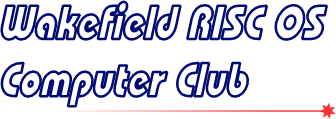Meeting: Mel Pullen
Mel Pullen was a contractor with Acorn in their early days at Market Hill, before moving on to become one of the founders of SoftMachinery. He visited us to talk about subjects ranging from the birth of the BBC Micro, modems and teletext adaptors, via bulletin boards and MUDs, through to ARM and the mobile phone industry – with anecdotes about the people and hardware that had made it all happen along the way.
Report by Steve Fryatt
The May meeting was opened by Chris, our Chairman, who reported – in his other capacity as Show Organiser – that the 2010 event had been a success given the circumstances. Numbers were down more than had been originally expected, even with our concerns over the economy: we suspect this was due to the complete lack of print advertising caused by failures at both Archive and Qercus.
Despite this, we managed to break even due to a last minute sponsor and the attendance of some additional exhibitors, meaning that we can contemplate doing it all again next year. Around £450 was raised for the Wakefield Hospice at the event, and Chris said that he hoped to be able to get someone from the charity to visit us and collect the money in person at a future meeting.
With the preliminary notices out of the way, Chris introduced our visitor. Mel Pullen’s first contact with what was to become Acorn had been while working as a contractor for a travel agent around the corner from their offices on Market Hill in Cambridge. He was offered a job by Chris Curry, and joined the fledgeling company to help sort out their chaotic business practices.
Before the Micro
These were the pre-BBC days, and the Cambridge Processor Unit was still involved with projects that have now largely been forgotten: systems for petrol stations, and microprocessor controlled fruit machines as described by Steve Furber during his talk at last year’s Retro Reunited. These were the early days of computer technology in casinos, and Mel recalled the systems being returned for analysis and reprogramming when punters had struck it lucky.
Before the Atom, Acorn had produced the early System machines and Mel talked about these and about the interesting approach to software source control employed by Sophie Wilson at the time. To make changes, the contents of a ROM would be disassembled, altered and re-assembled before being blown into a new chip; the checksum would then be written on the case, and that number – held in Sophie’s head – would provide details of which revision was which. It would seem that this could make it difficult for others to work on the code!
Acorn’s initial bid to produce a computer system for the BBC’s Literacy Project had lost out to the NewBrain, and the engineers realised that a way to win the contract would be to offer the Beeb the facility of Telesoftware – the ability to transmit data over Teletext. This would obviously require hardware to receive the television signal and decode the data into a form that the micro could read and, once Acorn’s second bid had been successful, the task fell to Mel to design it.
Teletext
As part of the BBC’s plans, the tuner was produced for Acorn by another company – leaving them with the job of taking the signal from this and getting it into a form that the Beeb could understand. Reluctant to pay for a full set of custom integrated circuits, Chris Curry and Hermann Hauser encouraged Mel to go down the route of discrete components: leaving the computers’s processor to do much of the work.
A prototype was duly built in wirewrap, and testing began. Unfortunately, the signal that was decoded – although present – was always garbage and, despite the best efforts of the BBC’s transmission engineers who came in to help, no solution could be found. In the end Mel’s lab moved from Market Hill to another of Acorn’s sites on the outskirts of the city, in case local interference was to blame – with no effect. It was eventually discovered that a set of wires on one of the chips had been connected in the wrong order, and with this corrected the decoder started to work perfectly. As a fellow hardware designer, I could certainly sympathise with this!
As time went on, Mel joined forces with a group of other contractors to form SoftMachinery – who went on to do contract work for Acorn and other companies. As the comms scene began to take off in the 80s, it was their modems and software that powered many of the new-fangled viewdata systems offering emails and discussion forums, information and software to download over the telephone line.
A brace of Beebs
One theme that seemed to be common through the years was a difficulty in getting money from Acorn on time. Mel described a number of approaches that had proved successful, but still there were occasional issues. One payment had been received in the form of a job-lot of Model A computers; in the end, these were upgraded to Model Bs and sold on at a decent profit.
Mel’s involvement with Acorn had ended by the time the Archimedes came out, so although he was aware of the systems that we currently use, he had little direct experience of them. He had continued with the contracting and consulting, doing work for Sinclair and the mobile phone industry – the latter had ensured continued contact with ARM processors.
For a man who arrived with four mobile phones in his possesion (which all needed to be silenced at the start of the evening), his predictions for the future of the humble handset were gloomy. Although the days of the smartphone may be numbered, the future could well involve less generic units that do one job well but still retain connectivity. Watch this space, it seems.
Any questions?
The evening ended with questions from the floor, including thoughts about the future of analogue teletext services in a digital age and (of course) where it had all gone wrong for Acorn. The ensuing discussion proved interesting, and we learned a few more anecdotes about the birth of the British computer industry.
At the end, those present thanked Mel for an interesting evening, mixing nostalgia with a look towards the future. It was only a pity that so few members were able to be in the audience to hear a talk which was refreshingly different from our normal topics.







